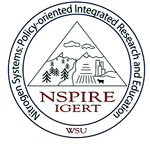Evaluation
The assessment plan will be designed to report on all of the program goals and objectives, with an additional focus on evaluating the educational component. An external program evaluator from the Northwest Regional Education Labs (NWREL) in Portland, OR will manage the assessment.
Programmatic Outcomes include:
- NSPIRE students have skills and knowledge necessary to work effectively at the interface of science and policy
- Satisfaction of stakeholders with performance of student interns
- Integration of NSPIRE students among and between cohorts
- Publication productivity of NSPIRE students
Assessment of these outcomes, particularly for impact, will require multiple methodologies as they do not lend themselves to traditional, comparative strategies, often thought to provide impact assessment information. Consequently, impact evaluation will place considerable focus on qualitative methodologies and triangulating findings.
We will employ both formative (along the way) and summative (after conclusion of project) assessments including surveys, individual interviews, focus groups and classroom observations. Near-term learning outcomes that deal with the development of knowledge, skills, and experiences that are interdisciplinary in nature are listed below. CEA staff will guide NSPIRE faculty in developing and implementing methods to effectively assess and evaluate these learning outcomes.
NSPIRE Student Educational Outcomes
Technical
- Understand the chemical nature, sources, fates, and conversion of nitrogen cycle species.
- Utilize modern technology to measure elements of the nitrogen cycle, to quantify the uncertainty of these measurements, and to understand the limitations of the measurement methods.
- Critically evaluate research literature on factors related to nitrogen cycle dynamics.
Policy and Communications
- Understand and evaluate the scope and development of policy/ rules/regulations that are related to nitrogen in the environment.
- Understand the relationship between the science and public policy related to nitrogen in the environment.
- Discuss in written and oral forms in an interdisciplinary scientific context and with stakeholders possessing varying technical expertise about nitrogen science and policy issues.
- Understand, evaluate, and apply best practices in engineering and science and presentation of technical information.
- Develop a research proposal with recognized broad impacts and policy implications on nitrogen cycle dynamics.
|
